
Did Greeks worshipped lord krishna
Krishna-THE BLACK ONE, the ever-pervading, the all-attractive, Gopala (Protector of cows), Megh-varna, one with color-of-clouds, Madan-Mohan who enchants everyone with his beauty and acts, Murli-manohar, One who steals everyone hearts by the sweet melody of his flute. You may be aware of many more names associated with lord Krishna. You may also be aware of his ability to enchant all living beings of this universe which includes his villagers, plants, animals etc. Hundreds of stories surrounding lord Krishna can be found in ancient Indian texts but what you may not know is that he enchanted not only Indians but also the western ideologists, historians and philosophers.
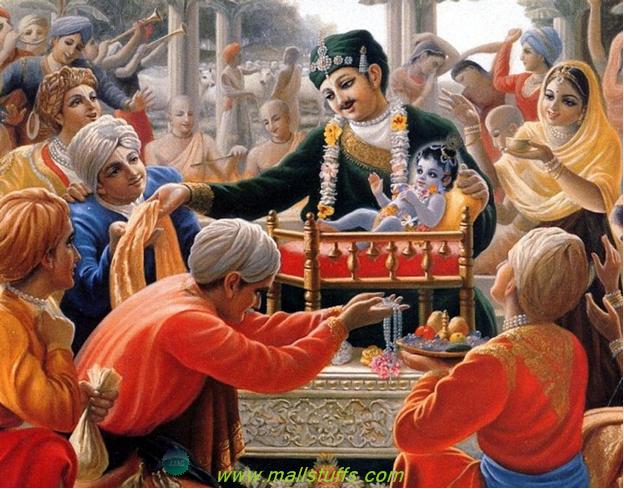
All villagers attracted to lord Krishna
Some westerners were so attracted to lord Krishna that they carried his stories along with them in their countries and narrated these stories to their kings, citizens, friends, ministers etc. This resulted in localization of stories where these stories were modified to suits their local cultures, gods and deities.
Heracles is Krishna
One of such localization is Greek god Heracles. If you compare lord Krishna with Hercules then you find many similarities. For example, Krishna subdues the dangerous serpent Kaliya while Hercules subdues the equally monstrous Hydra and also beheads the snake-headed Medusa whose single look could turn anyone into stone.
Krishna subduing Kâliya serpent
Story of lord Krishna subduing Kâliya serpent is as follows:
Once Krishna along with his friends were playing ball near tha river yamuna. While playing, krishna accidently throws the ball in the rirver yamuna. To get the ball, Krishna went inside the river. Serpent kaliya wrapped lord krishna with his hundureds of hoods voimiting poison. With immense power and strength, lord krishna yeilded huge blows to kaliya serpent. Kaliya seprent succumbed to lord krishna strength and accepted defeat. Lord krishna then started dancing on the head of kaliya serpent exerting the weight of the entire universe.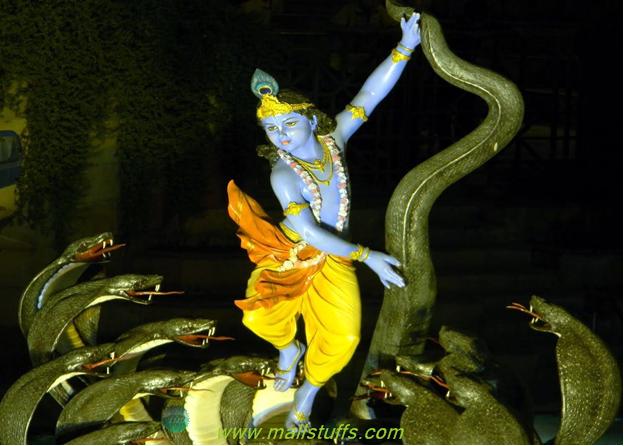
Lord Krishna Dancing on Kâliya serpent
compleely exhausted, Kaliya began to die. Seeing this, kaliya wives stepped in and begged him ith folded hands for forgiveness. Lord krishna accepted the prayers of kaliya wives and asked kaliya to leave the river immediately. Recognizing the strength of lord krishna, kaliya surrendered and agreed to go to Ramanaka Dwipa. Some identify Ramanaka Dwipa as Fiji island near to new zealand.
Similarities of Krishna with Heracles
Krishna didn’t kill Kalingarayan(Serpent kaliya), instead he asked him to leave the Yamuna river and go far away from his villagers and common people. Simialrly, Hercules didn't not kill Serpent hydra, he only placed a huge stone over his head.
Megasthenes referred Krishna as Heracles
Greek ambassador to India in 300 BC, “Megasthenes” wrote a literary book on Indian culture and his spiritual journey in India. Megasthenes was appointed as ambassador to the great vaishnava monarch Chandragupta maurya by king of taxila empire. Megasthenes journeyed across India and wrote what he saw and heard in his literary works 'indica'. In indica, there is a mention of Indian tribe called Sourasenoi, who worshipped Herakles in their land. This land had two major cities Methora and Kleisobora, and a navigable river, the “Jobares”. Now if you try to find this description in Indian scriptures then you can easily relate his description to lord Krishna. Sourasenoi refers to Shurasenas, a branch of the Yaduvanshi dynasty(Clan of lord Krishna); Herakles(Hari-Krishna) to Krishna , Mehtora to Mathura, birth place of Krishna, Kleisobora to Krishnapura, meaning "the city of Krishna"; and Jobares to the Yamuna, river flowing nearby Mathura.
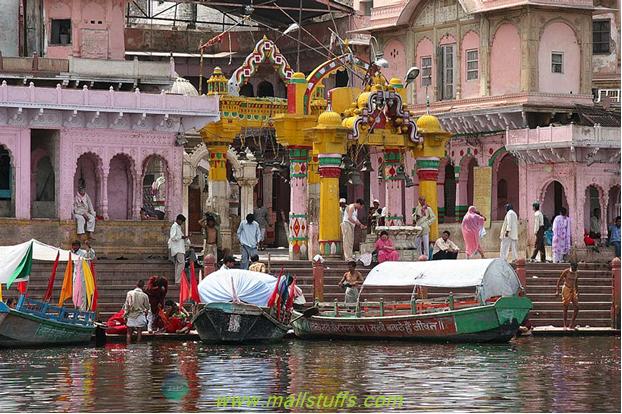
City of Mathura, next to river yamuna
Now notice the change in words used my Megasthenes. He was describing the Indian story of lord Krishna but he didn’t use the same words and modified all words a little in his works. One of the reasons for this may be the wrong grammatical pattern of Greek language because of which the pronunciation differs slightly. Or this may be because the Greek, like other westerners, were not able to pronounce the Sanskrit words or Indian names exactly. Or it may be to fabricate the story in such a way that it appeals to the local crowd, local culture, local traditions thereby forcing them to incorporate the story in their local culture and traditions or the Greek historians may be trying to expand their own religion by incorporating extravagant magnificent divinities of other cultures. Moreover, the slight change in stories between Heracles and lord Krishna may be due to language barriers, miscommunication or mistranslation by Indian or Greek scholars.
Owing to host of many such reasons, Indian stories often were depicted by foreign stories in terms of their own divinities, culture, customs and traditions.
Quintus Curtius referred Krishna as Heracles
Quintus Curtius in his literary work describes that when Alexander the Great confronted porus, the then king of india, porus soldiers were carrying an image of herakles in their vanguard. Porus soldiers were followers of lord Krishna and read bhagavad gita for motivation before going onto any war.
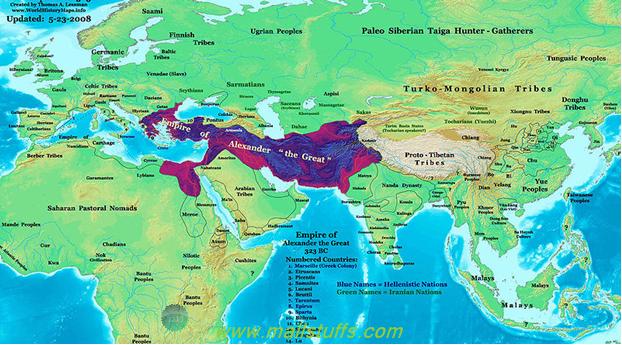
Alexander reaching the border of porus kingdom in his conquest of conquering east
So, here Quintus Curtius mentioning Heracles means that porus soldiers were carrying an image of lord Krishna as their idol and mentor. Even Quintus curtious mention Krishna as Heracles. So, he meant to say Heracles is none other than lord Krishna or he may be referring to the similarities between lord Krishna and Heracles. But if the latter case is true, then the author must have mention anything of that kind in his literary works. So, one can think of Heracles as localized form of lord Krishna.
Amazingly, there are many other references to lord Krishna by Greek travelers who came to India after Alexander invasion to Asia.
Greek scholar Seleucus referred Krishna as Heracles
Greek scholar “Seleucus“ sent to maurya empire states that the city Polibrotha (Pataliputra or Patna) was founded by Heracles, 138 generations before the reign of King Sandrocottas.
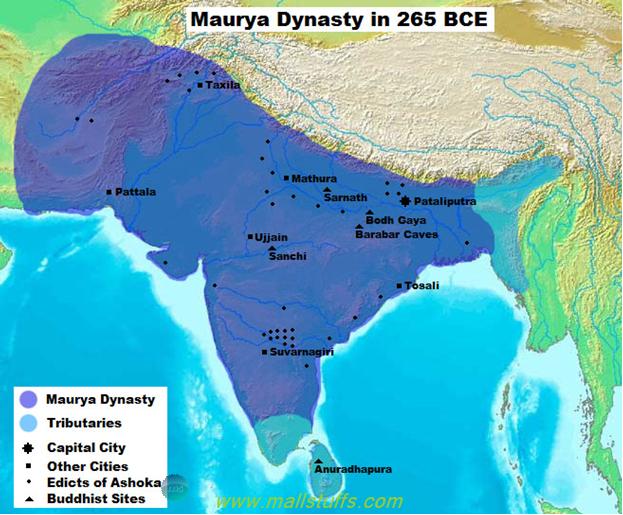
Maurya Empire and its capital Polibrotha (Pataliputra)
Again the Greek have localized the words. Polibrotha is present Patna, but was the capital of ancient mauryan empire and Sandrocottas was the name given by Greek to Chandragupta Maurya, the then king of India. Now if Greek can refer Chandragupta maurya as Sandrocottas then why Greek must have not named Heracles as Krishna.
Let us validate this Greek text. According to the text, Heracles lived 138 generations before the time of Sandracottos and Alexander. This is pointing to a time somewhere around 330 BC. As per the historical records of Indian history, most Indian kings ruled for an average period of 20 years. Taking 20 years as one generation, I would multiply 20 by 138. This is equal to 2760. Adding 330 to 2760, we get 3090 BC. This is remarkably close to the kaliyuga date of 3102 BC which is supposed to be the ruling time of lord Krishna as per the scriptural records(Check the image below).
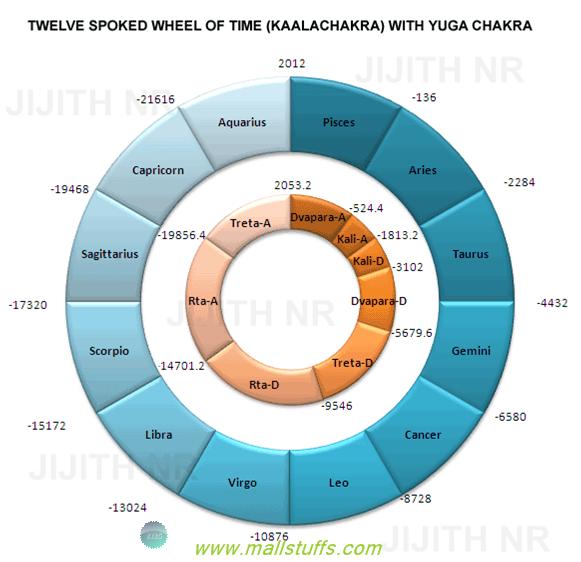
Indian calendar depicting the repetitive four yuga
This Greek text in a way not only proves the historicity of lord Krishna but also proves Heracles is lord Krishna. If some foreign author is talking about the existence of lord Krishna in 330 BC (three millenniums ago) then why today Indians find it difficult to accept the historicity of lord Krishna. Some authors like Pliny directly refereed the word Krishna as Heracles, derived from Hare-Krishna.
Evidence from other Greek texts
Now let us look one more evidence from greek texts
"The people of Marathon worship both those who died in the fighting, calling them 'heroes,' and [a semi-divine being called] 'Marathon,' from whom the country derives its name, but also Heracles . . . . They say also that a man took part in the battle that looked and was dressed like a farmer. He slaughtered many of the Persians with his plowshare, and when everything was over he disappeared. But when the Athenians consulted the oracle, the god would not tell them anything except to honor 'Echetlaeus' [i.e. the man with the plowshare] as a hero."
In the above verse, it is clearly said that the Indians worship those who died in battle which is an honorable act even done today for Indian army soldiers. It also says about the worship of Krishna which is again true and confirmed by Indian scriptures. It also talks about the man dressed like a farmer with a plough in his hand. No doubt Greeks were referring to balarama, brother of lord Krishna.
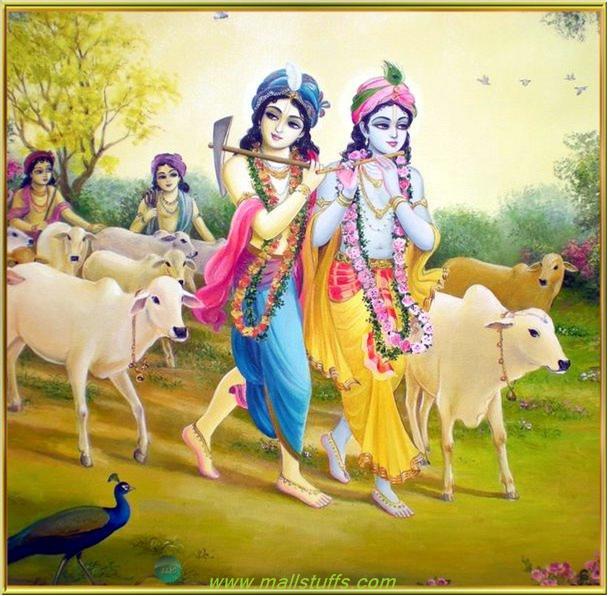
Balarama with plough in his hand, along side of lord Krishna with flute on his head
It says that before his disappearance, the person with a plough slaughtered many Persians with his plough. Now many kings attacked lord krishna kingdom and the last of them were 'Salwa'. As per the Mahabharata, this kingdom was west to India somewhere in regions of present Afghanistan and Iraq which was ancient Persia.Incidentally, there is a place called salwa in kuwait which must be ancient Salwa kingdom. It further says the Greek priest asked the locals to honor Balarama which means they not only worshipped lord Krishna but also his brother balarama.
Greek king Agathocles worshipped lord krishna
This saying of Greek priest was followed by Greek king Agathocles. Between 190 and 180 BCE, Agathocles ruled Ai-Khanoum, in the Kunduz area of Afghanistan. He isues several silver, gold and bronze coins, rectangular or square in shape with images of Indian deities like Shiva,Vishnu,Vasudeva,Balarama and Buddha. Inscriptions were written on these coins in Brahmi language, that the money belonged to Rajane Agathuklayasa.
Dating to 180- BC, These square coins with Balrama on one side and krishna on the another, were excavated recently from Al Khanoun in Afghanistan. This is one of the earliest proof that lord krishna was worhipped as a major deity and also the proof that indian kingdom extended upto afghanistan and iraq.
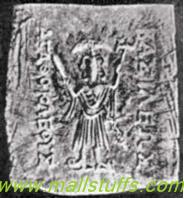
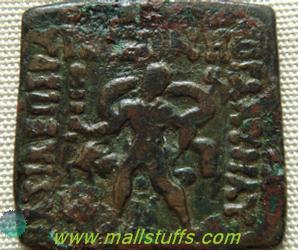
Vasudeva holding a sankha and a chakra on one side and balrama holding a plough and gada(Mace) on the other
Greek ambassador Heliodorus worshipped lord krishna
Greek ambassador Heliodors was so fond of herakles(Lord Krishna) that he created multiple garuda banner dedicated to lord Krishna. This description can be found at the Besnagar inscription (Present day Bhopal) in Madhya pradesh. The modern shape of the column lead scholar Cunningham to date it wrongly to the Gupta Dynasty period(CE 300-550). However, Thirty-two years later,two gentlemen,Dr. J. H. Marshall and Mr. Lake saw some inscription on column lower part, an area where devotees follow the custom of smearing red paint. On removing the thick red paint, an brahmi inscription dated to 113 BC was found. This inscriptions records the erection of garuda in honour of Vasudeva(Krishna), god of the gods.
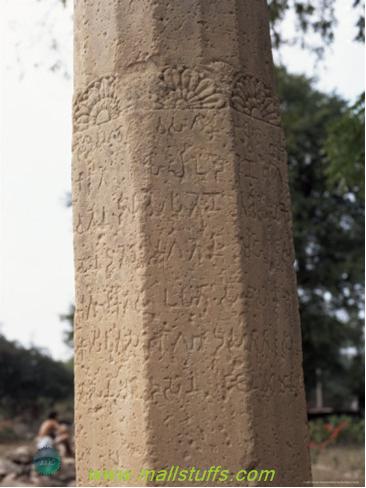
Brahmi inscription on heliodors column
The exact inscription can be translated as
"This Garuda-column of Vasudeva (Visnu), the God of Gods, was erected here by Heliodorus, a worshipper of Visnu, the son of Dion, and an inhabitant of Taxila, who came as Greek ambassador from the Great King Antialkidas to King Kasiputra Bhagabhadra, the Savior, then reigning prosperously in the fourteenth year of his kingship."
In Indian scriptures, lord Krishna is repeatedly called as god of all gods and the source of all incarnations and so, is rightly projected as the supreme god. Ambassador Heliodors came from the Greek king Antialcidis to the kingdom of Kautsiputra Bhagabhadra, fifth king of Sunga Empire. This inscription is dated to fourteenth year of the regime of sunga king bhagabhadra and so is approximated to 113 B.C."
Krishna earlier avatar narasimha worshipped
There is one more story strikingly similar story found in Indian scriptures. It talks about the Hercules killing a nemean lion. Once there was a fierce lion roaming ancient Nemea in Greece. Eurystheus ordered Hercules to kill the Nemean Lion. Accordingly Hercules went and killed the lion. After killing the Nemean, Hercules skinned the lion and wore the skin like a coat of Armour.
Now, what is the similarity of this story with the story of Krishna? This story is now part of 10 avatars of Vishnu. This story is of lord Vishnu fourth avatar Narasimha killing demon Hiranyakashyipu
One can easily conclude that the story of lord narasmiha was rejuvenated in a slightly different way by Greeks. This story of lord narasimha is said to be of Dwapar yuga, i.e this incident happened many millions of years ago.
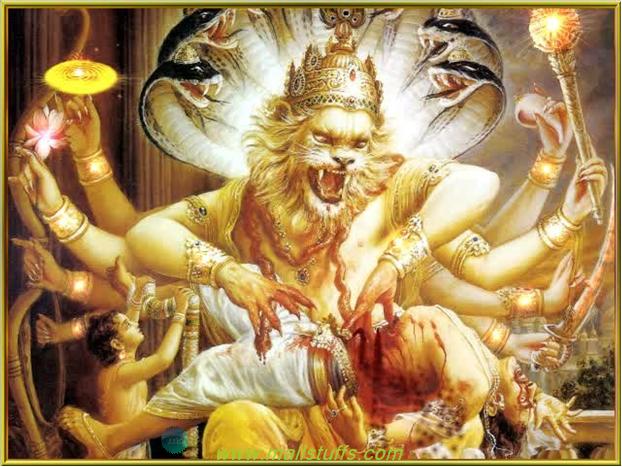
Narasimha killing demon Hiranyakashyipu
These stories mentioned in Indian and Greek scriptures are often termed as mythology. But even this word mythology comes from India. It is derived from the truth, seen also in the Spanish word men-ti-ra, falsity, and ultimately coming from the Sanskrit mithya.
Quotes by famous scholars and historians
Below are some of the quotes by famous historians and scholars on greek worship of krishna
Dr. Thomas Hopkins said: “Krishna the historical prince and charioteer of Arjuna.” (HK pp. 144) “Krishna had been revealed as the Supreme Lord, identified with Vedic Brahman and Purusa and with the universal form of Vishnu. He is the culmination of the all religious forms of the Vedas.” (HT pp. 94)
Alain Danileou (1907-1994), son of French aristocracy, author of numerous books on philosophy, religion, history and arts of India, including Virtue, Success, Pleasure, & Liberation: The Four Aims of Life in the Tradition of Ancient India. He was actually one of the first European converts,settling in India for fifteen years in the study of Sanskrit. He said:
"The Greeks were always speaking of India as the sacred territory of Dionysus and historians working under Alexander the Great clearly mention chronicles of the Puranas as sources of the myth of Dionysus".
Further, Alain Danielou quotes Clement of Alexandria who admitted that "we the Greeks have stolen from the Barbarians their philosophy."
German orientalist Christian Lassen [1800-1876] was the first scholar to bring Megasthenes into the debate on the borrowing theory. He noted that Megasthenes wrote of Krishna under the pseudonym of Heracles and that Heracles, or Krishna, was worshipped as God in the area through which the Yamuna River flows.
A respected German Indologist, Richard Garbe [journeyed to India 1885-1886], agreed with Lassens analysis and called the testimony of Megasthenes indisputable.
The New British Encyclopaedia: “Vasudeva-Krisna, a Vrisni prince who was presumably also a religious leader levitated to the godhead by the 5th century B C.” (5)
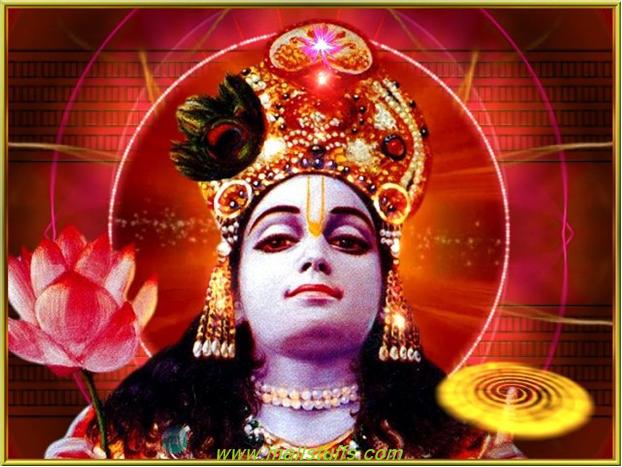
Vasudeva-Krisna, god of the gods
Rudolf Otto, 1933: “That Krishna himself was a historical figure is indeed quite indubitable.”
Our education has been spoiled by british government. Our education is totally british based. In our school, we are taught that Indian epics-Ramayana and Mahabharata are mythological stories brilliantly written-a product of the fertile imagination of ancient vedic sages who migrated from europe. Sadly, we believe them inspite the huge volumes of archaelogical, astronomical, literary, scriptural evidences in multiple texts like Puranas,Upanishads, vedas etc. Number of evidences of lord krishna is more tha the number of evidences of king alexander, all of which has been shared by me in my previous articles.
Western religious fundamentalists have been trying hard to discredit the ancient Indian civilization. This has led to millions of Indians growing up without any recognition nor any sense of respect for their rich ancient past - a advanced civilised history of at least 10,000 years. This nexus of religious missionaries and European Indologists, which developed during the British period, were further supported by leftist and south indian historians, who spun the lies under british influence, who were not even qualified to speak about indian scriptures at the first place. Even today, This nexus, which includes western media has become so powerful that one who questions the act of other religious fundamentalists are branded as Hindu fundamentalists.
Seeing the increasing need of reviving the great historical ancient past of Indian civilization, I would be posting many more articles comparing the myths of Indian literature with other ancient civilizations and also to demonstrate the rich cultural heritage of India.
"Let our Christian readers bear in mind that the worship of the virgin and her child was common in the East, ages before the generally received account of Christ's appearance in the flesh."- Thomas Hopkins
Hare Krishna Hare Krishna
Krishna Krishna Hare Hare
Hare Rama Hare Rama
Rama Rama Hare Hare